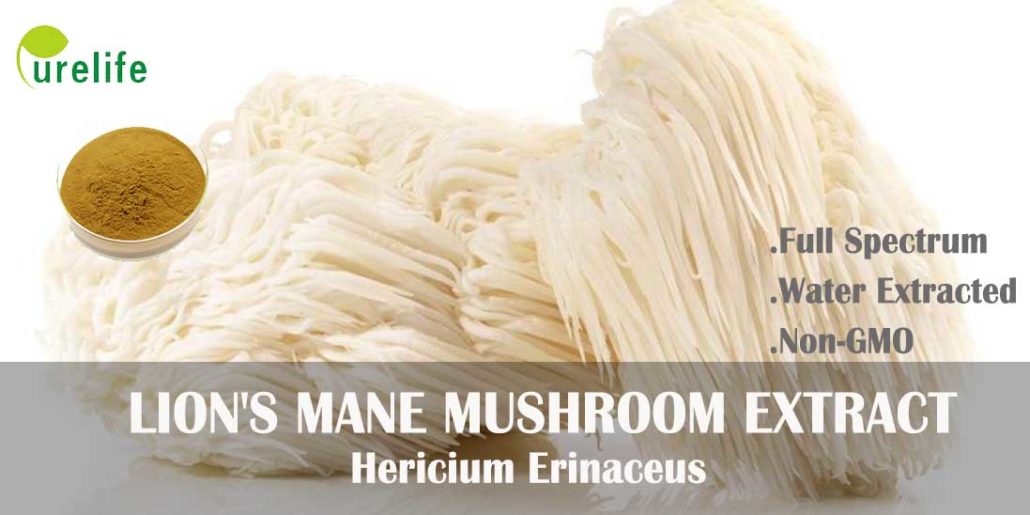Lion’s Mane Mushroom extract improves memory and mood
Lion’s Mane mushroom, also known as Hericum erinaceus, Hedgehog Mushroom or the Bearded Tooth Mushroom, is used as food and dietary supplement for hundreds of years. It is commonly found on broad leaf trees and logs, and according to recent researches, Lion’s Mane Mushroom contains a number of polysaccharides, such as B-glucan, D-Glucan, heteroglucans and erinacine, D-arabinitol, Nerve Growth Factor (NGFs) etc ,these substances make this kind of mushroom effectively optimize the brain nervous system, prevent and improve brain cognitive function. Therefore , many researchers conclude that Lion’s Mane Mushroom extract improves memory and mood.

In a recent experiment, mice were injected with neurotoxic peptides to assess the effects of lion’s mane on the type of amyloid plaque formation seen in Alzheimer’s patients. The mice were then challenged in a standard “Y” maze, designed for testing memory. Mice fed with a normal diet were compared to those supplemented with lion’s mane mushrooms. As the peptide-induced plaque developed, the mice lost the ability to memorize the maze. When these memory-impaired mice were fed a diet containing 5 percent dried lion’s mane mushrooms for 23 days, the mice performed significantly better in the Y maze test. Interestingly, the mice regained another cognitive capacity, something comparable to curiosity, as measured by greater time spent exploring novel objects compared to familiar ones.
The reduction of beta amyloid plaques in the brains of mushroom-fed mice vs. the mice not fed any mushrooms was remarkable. The formation of amyloid plaques is what many researchers believe is a primary morphological biomarker associated with Alzheimer’s. Plaques linked to beta amyloid peptide inflame brain tissue, interfere with healthy neuron transmission, and are indicated in nerve degeneration.
As the baby boomers population age, the medical community is prepared to accept more Alzheimer’s and Alzheimer’s patients. Mortality rate from Alzheimer’s disease is outstripping other mortality from many other diseases, which makes the prevention and treatment of age-related cognitive diseases has become a hot subject in people’s research. In the past 10 years, the deaths from Alzheimer’s disease has risen by about 66 %, but the number of deaths from other primary diseases has generally declined.
There may also be other benefits to neurological function from Lion’s Mane Mushroom extract — making you feel comfortable. In another small clinical study (n=30), post-menopausal women who consumed lion’s mane baked into cookies vs. those without showed less anxiety and depression yet improved in their ability to concentrate
In another small Japanese study with a randomized sample of 30 women, the results showed that the ingestion of Lion’s Mane mushrooms may reduce depression and anxiety, and these results suggest a different mechanism from NGF-enhancing action of Lion’s Mane mushrooms.
Another study conducted by the Tohoku University explored the effects of mushrooms on nerve growth and came to a startling conclusion. Specifically, they concluded that out that out of all the edible mushrooms available today, it is only Lion’s Mane that has a positive impact on nerve repair. What happens is that some particles of Lion’s Mane are digested and distributed through the body – allowing them to cross the blood-brain barrier. Once these particles manage to pass the line, they are capable of directly stimulating the production of enzymes that release the Nerve Growth Factor and repairing nerve myelin. This ability to enhance nerve regeneration could be helpful in managing current conditions such as Alzheimer’s, dementia, senility, muscular dystrophy, Parkinson ’s disease, and other neurological problems.


